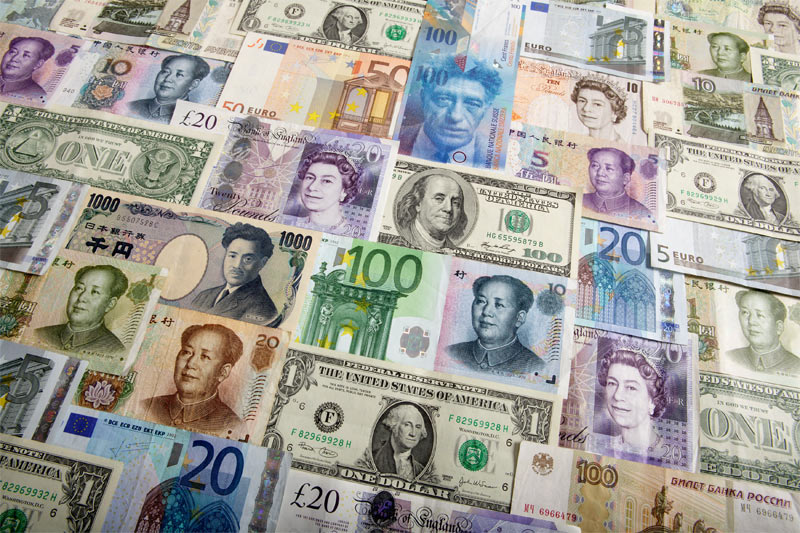Investing.com - The U.S. dollar pulled back from session lows against the yen on Tuesday following the release of better-than-forecast U.S. retail sales data, while the euro remained lower after weak German economic data.
During European afternoon trade, the dollar eased back from session lows against the yen, with USD/JPY down 0.82% to 88.72, up from session lows of 88.29.
The Commerce Department said U.S. retail sales rose 0.5% in December, beating expectations for a 0.2% gain.
A separate report showed that producer prices in the U.S. fell 0.2% last month, compared to expectations for a 0.1% decline.
Another report showed that the Empire State manufacturing index declined to minus 7.8 in January from a reading of minus 7.3 in December. Analysts had expected the index to improve to 2.0.
The yen strengthened broadly earlier after Japan’s Economy Minister Akira Amari said that a weak yen could have a negative impact on the economy by pushing up import prices.
The greenback was higher against the euro, with EUR/USD down 0.43% to 1.3323.
Sentiment on the euro was hit after preliminary data showed that Germany’s economy contracted by 0.5% in the fourth quarter, bringing the annual rate of growth to 0.7%, a sharp slowdown from 3% growth in 2011.
A separate report showed that the euro zone trade surplus widened to EUR11 billion in November from EUR7.4 billion in October, as exports rose 5%.
The greenback was higher against the pound, with GBP/USD sliding 0.23% to 1.6040.
In the U.K., official data showed that consumer inflation remained unchanged at 2.7% in December, broadly in line with expectations, as increases in electricity and gas bills were offset by falling fuel costs.
The greenback was higher against the Swiss franc, with USD/CHF rising 0.62% to 0.9275.
The greenback pushed higher against its Canadian, Australian and New Zealand counterparts, with USD/CAD adding 0.22% to trade at 0.9858, AUD/USD down 0.27% to 1.0533 and NZD/USD falling 0.49% to 0.8387.
The dollar index, which tracks the performance of the greenback versus a basket of six other major currencies, was up 0.27% to 79.72.
Dollar demand remained supported amid uncertainty over the U.S. debt ceiling deadlock, after President Barack Obama urged Republicans to approve an increase in the borrowing limit without seeking policy concessions in return.
During European afternoon trade, the dollar eased back from session lows against the yen, with USD/JPY down 0.82% to 88.72, up from session lows of 88.29.
The Commerce Department said U.S. retail sales rose 0.5% in December, beating expectations for a 0.2% gain.
A separate report showed that producer prices in the U.S. fell 0.2% last month, compared to expectations for a 0.1% decline.
Another report showed that the Empire State manufacturing index declined to minus 7.8 in January from a reading of minus 7.3 in December. Analysts had expected the index to improve to 2.0.
The yen strengthened broadly earlier after Japan’s Economy Minister Akira Amari said that a weak yen could have a negative impact on the economy by pushing up import prices.
The greenback was higher against the euro, with EUR/USD down 0.43% to 1.3323.
Sentiment on the euro was hit after preliminary data showed that Germany’s economy contracted by 0.5% in the fourth quarter, bringing the annual rate of growth to 0.7%, a sharp slowdown from 3% growth in 2011.
A separate report showed that the euro zone trade surplus widened to EUR11 billion in November from EUR7.4 billion in October, as exports rose 5%.
The greenback was higher against the pound, with GBP/USD sliding 0.23% to 1.6040.
In the U.K., official data showed that consumer inflation remained unchanged at 2.7% in December, broadly in line with expectations, as increases in electricity and gas bills were offset by falling fuel costs.
The greenback was higher against the Swiss franc, with USD/CHF rising 0.62% to 0.9275.
The greenback pushed higher against its Canadian, Australian and New Zealand counterparts, with USD/CAD adding 0.22% to trade at 0.9858, AUD/USD down 0.27% to 1.0533 and NZD/USD falling 0.49% to 0.8387.
The dollar index, which tracks the performance of the greenback versus a basket of six other major currencies, was up 0.27% to 79.72.
Dollar demand remained supported amid uncertainty over the U.S. debt ceiling deadlock, after President Barack Obama urged Republicans to approve an increase in the borrowing limit without seeking policy concessions in return.
